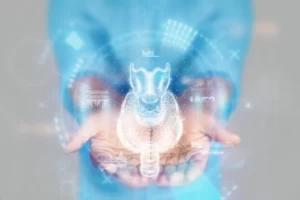:Functions of the thyroid gland
The thyroid gland controls the frequency of energy use in the body, the production of proteins, and controls the sensitivity of the body to other hormones found in the body.
The thyroid gland also: increases or decreases the energy in the body, increases or decreases the burning of fats, controls weight loss, increases the heart rate, affects the appetite, helps the intestines to work efficiently, helps the menstrual cycle to be in order, maintains the health of the hair, the health of the nails and skin. The thyroid also helps with good sleep and is also related to mental health.

The relationship between thyroid hormones and other hormones
The Adrenal Gland
Let's say the thyroid gland is a foot on the gas pedal. As soon as you press the gas pedal and the car moves forward. The car will only move forward if there is enough fuel in the tank. The cortisol produced in the adrenal gland is the "fuel" in the tank. That is why it is very important to support the adrenal gland while treating the thyroid gland.
Estrogen
Estrogen suppresses thyroid function while progesterone helps the thyroid function normally. If a woman is estrogen dominant, meaning she has more estrogen than progesterone, she can reach a state of abnormal thyroid function. Improving the balance between estrogen and progesterone can help the thyroid function normally without thyroid medication.
Another reason to treat the adrenal gland
If you are already taking thyroid medication, and your thyroid blood tests look normal, but you feel weak and unstable. The reason is that the adrenal gland is not strong enough to support the thyroid gland. If you give the adrenal gland the nutrients it needs and its hormones – this will help the thyroid gland to function better.
We emphasize that a person can have hypothyroidism even with normal blood tests. That would be called Functional Hypothyroidism. It is very common. Due to the centrality and importance of the function of the thyroid gland, many symptoms indicating the existence of this functional disorder are common to functional disorders in other systems.
Important information that must be considered when you consider the need for treatment, in hypothyroidism symptoms and symptoms are characterized by a constant worsening process that occurs when an adequate treatment response is not given. The process of gradualism carries with it two dangers –
One, that at the beginning of the journey one does not feel a significant change in function and ignores its existence.
The second danger is that gradualism creates a state of getting used to the symptoms and the phenomenon is not stopped until it worsens, which involves great discomfort and
suffering for those who experience hypothyroidism.
Another important issue that we must note is that the variability between patients means that the intensity of the symptoms and sometimes their very appearance varies from patient to patient. In other words, the gradualness sometimes hides the existence of the phenomenon and the subjective response to lower thyroid activity may lead to complete ignoring of the phenomenon until significant aggravation and complex functional disorders.
HYPOTHYROIDISM
The thyroid gland has a butterfly shape and is found in the frontal part of one's neck. This gland produces and secretes many hormones into the bloodstream and influences many bodily systems, including metabolism.
Hypothyroidism describes a situation where the thyroid gland is malfunctioning.
Here are answers to some prominent questions asked:
What is Hypothyroidism ?
Hypothyroidism is about endocrinologist irregularities that find their source in the stimulating hormones of the thyroid gland, the pituitary gland, or the hypothalamus.
Studies show that hypothyroidism contributes to a wide range of issues: over-sensitivity to cold and stress, menstrual irregularities, constipation, digestive disorders, metabolism problems, and more. By treating the thyroid, we can hormonal balance, using both medication and holistic treatment.

?What Else Causes Hypothyroidism
There is a wide scope of signs that one is developing Hypothyroidism. These stages of development may happen over several years time, making it difficult for the one suffering to realize that a chronic problem has emerged. Women experience these signs more often than men.
Here is a list of common signals of Hypothyroidism:
- Severe headaches
- Sensitivity to cold
- Constipation
- Digestive disorders
- Fatigue
- Weakness
- Swelling of the face
- High cholesterol
- Unexplained weight gain
- Hoarseness
- Depression
- Menstrual Cycle disorders
- Menstrual excess bleeding
- And other symptoms …
Failing to investigate these signals by evaluating hormonal balance, is likely to lead to a severity in these symptoms.
Nutritional Tips for Hypothyroidism
Refrain from eating raw calciferous vegetable, Cabbage, broccoli, cauliflower.
Refrain from excess soya products that affect the absorption of iodine.
Refrain from processed foods containing excess salt, fats, sugar.
Oatmeal is a beneficial nutritional supplement for hypothyroidism. Rich in fiber, vitamins and minerals, satiates and contributes to health and energy.
Celiac sufferers should ascertain the product is gluten-free, as Celiac disease is often connected to thyroid performance.
Chia seeds are an excellent source for Omega 3 fatty acids and fibers, protein, minerals and vitamins that assist in absorbing medication and reducing bodily infections. It is important to drink sufficient water with chai seeds in order to compensate for their expansion in the stomach.
T4 hormone production and a healthy digestive system
The thyroid gland participates in all body processes mainly by producing the inactive hormone thyroxine (T4) which needs to be converted to the active hormone triiodothyronine (T3) in the liver or other organs. 20% of the thyroid hormone T4 is converted to T3 in the gut, but this only happens if we have healthy gut bacteria. Therefore, the digestive system must be healthy in order for us to have normal thyroid function.
Another reason why it is important for the digestive system to be healthy: When a person suffers from an autoimmune disease (a disease caused by a mistaken reaction of the immune system), it means that the immune system is not working well, for example Hashimoto disease (under-activity) or Graves, disease (over-activity). Since 70% of the immune system is in the intestines, it is important to do comprehensive stool tests to ensure that the digestive system is healthy.
If there is a patient suffering from thyroid symptoms, the goal of the treatment may be to raise the FreeT3 in the upper third of the norm. Another example of how the thyroid gland affects and is affected:
When a patient has hypothyroidism, it is very likely that he will develop high cholesterol, therefore treatment of the thyroid gland can bring back cholesterol from a high level – back to a normal level of cholesterol.





